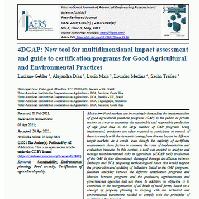Resumen
- Food markets are increasingly demanding the implementation of good agricultural practices programs (GAP) in the public or private sectors as a way to guarantee the sustainable and responsible production of safe food. Due to the large number of GAP programs being implemented, producers are often required to participate in several of them to comply with the demands coming from diverse buyers in different target markets; as a result, even though the majority of certificate requirements share factors in common, the costs of implementation and evaluation increase. In this context, a tool was created to analyze and manage multidimensional risks in agriculture (4DGAP tool) (evaluation of the GAP in four dimensions), developed through an alliance between Embrapa and IICA proposing methodological bases that would support the preparation and updating of indicators linked to the GAP programs, facilitate interplay between the different certification programs and likewise between programs and the producers, agribusinesses and governmental agencies that use them. In addition, its objective is to contribute to the reorganization of all kinds of rural farms, based on a concept of property planning in keeping with the technical and environmental parameters needed to comply with the principles of sustainable development.
